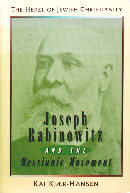HISTORICAL MESSIANIC LEADERS
No, Messianic Judaism is not new, it was a continuation of true Judaism. Messianic Judaism was almost squelched out in the year 325 C.E.(common era.,or A.D.) when the Emperor of Rome who was the leader of the Church of Constanpinople. At that time Constantine and The Nicean Council issued a decree divorsing all Messianic Jews...unless they wanted to assumulate and join what then became "The church".
After the bann on Messianic Jews, and Messianic Ger'eem (non-Jewish believers) to practise as they always had, it took a lot of chutspah (gall) to continue to do so. Many Messianic Jews have been killed by the Church. This article is to show you some of those who had chutspah to stand for the emeet of HASHEM (truth of G-d) when Messianic Judaism was not as widespread as it is today.
Nu!..My purpose in this section of T.O.M.J. Beis is to show that Jews have not always rejected Moshiach, and have not always assumulated in order to embrace him.
Rov Isaac (Yitzhak) Lichtenstein- early 1880's. A respected District Rabbi in Hungary, he picked up an old copy of the ReNewed Covenant (i.e. New Testament) and began reading it. As he later remarked, "Not the half had been told me of the greatness, power and glory of this Book, formerly a sealed book to me. All seemed so new, and yet it did me good, like the sight of an old friend who has laid aside his dusty, travel-worn garments, and appears in festive attire, like a bridegroom in wedding robes, or a bride adorned with her jewels."
Not too long after that, Rabbi Lichtenstein starting teaching from the Newer Testament to his synagogue and people. Because of his reputation and position, the Synod of Rabbis in Hungary cited him to appear before them and explain himself. After prolonged discussion and much interaction with Rabbi Lichtenstein, the assembled rabbis demanded that he should resign his position and be formally baptized. he replied that he had no intention of joining any church. He had found in the Newer Testament the true completion of Judaism; so he would remain as before with his congregation, and preach it in the synagogue. And, that's what he did despite persecution and abuse. From his official place as District Rabbi he continued to teach and to preach from the Newer Testament (i.e. "Renewed Covenant" mentioned by Yerme'yahu haNovi, Jeremiah 31:31). This was a testimony to the strong attachment of his own community and the attentiveness of his synagogue.
Soon, Rabbi Lichtenstein and his writings had become widely known, and many different church and missionary organizations sought his services.
The Papacy, too, soon learned of his existence and significance. A special emissary from the Pope visited Tapio Szele, Hungary, with attractive offers to join the Catholic Church. To all he had the same reply: "I will remain among my own nation. I love Messiah. I believe in the New Testament but I am not drawn to join Christendom, so I will remain among my own brethren, as a watchman from within and to plead with them to behold in Yeshua (Jesus) the true glory of Israel."
Joseph Rabinowitz (1837-1899) is one of the most remarkable figures of the recent history of Jewish believers. Joseph Rabinowitz grew up a Chossidic Jew. In the Russian town of Kishinev he set up a congregation which is called "The Israelites of the New Covenant." As a Jew who believed in Yeshua, Rabinowitz insisted on his Jewish identity; that caused some problems which Messianic Jews of our day are familiar with. In 1888 Rabinowitz said, "I have two subjects with which I am absorbed: one, the Messiah Yeshua (Jesus); the other, Israel."
Rabinowitz published at least one booklet in Yiddish in 1894 entitled "What is an Israelitte of the New Covenant?" in which two Rabbis dialog, one is Messianic, the other is not. All of Joseph Rabinowitz's derash'eem (sermons) were written in Hebrew, in which all, the term B'nai B'rit Chadasha (Sons of The Renewed Covenant) is found written upon them.

There is a book written about Joseph Rabinowitz called "Joseph Rabinowitz and the Messianic Movement" by:Kai Kjaer-Hansen, Birger Petterson (translator). ISBN #0-8028-0859-X (Library of Congress #)
by ŠT.O.M.J BEIS
BACK TO ARTICLES INDEX

